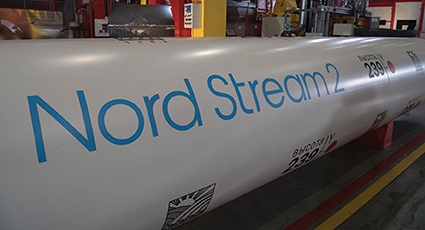French Engie Fearless in Face of Nord Stream-2 Sanctions
The French power company Engie will continue to support the project of construction of the Nord Stream-2 gas pipeline despite anti-Russian sanctions, Gérard Mestrallet, Chairman of the Board of Directors of the Engie Group, announced at the Gaidar Forum which ran from January 16 - 18 at the Russian Presidential Academy of National Economy and Public Administration (RANEPA).
“We, as partners in the Northern Stream-2 project, support and will support it under any condition,” he said, noting that despite the law adopted in August 2017 by the US Congress on new sanctions against Russian companies and projects, including Nord Stream-2, Gazprom had concluded an agreement with partners on the project far before the US sanctions law came into force.
“I believe there is no cause for concern,” Mestrallet said.
Engie, the first partners in the construction of the Nord Stream-2 gas pipeline, have started talking about a possible termination of project financing in order to avoid the US sanctions against Russia.
“If sanctions are applied, Engie can stop financing the project in order to avoid sanctions,” Deputy Director General of Engie, Pierre Scharer, told Bloomberg.
For now, the French company continues to comply with its obligations under the project financing agreement for Nord Stream-2 whereby it is to provide 10% of the total investment in the project. However, the US sanctions, if they are specifically applied against Nord Stream-2, may still affect future cash transfers.
Scharer noted that the participants of the Nord Stream-2 project, in cooperation with the European Commission, have found lawyers to protect themselves from the probable US sanctions. The top manager of Engie says it's good that the sanctions law adopted in the United States has no retroactive effect. That is, it will not affect the first Nord Stream.
The US bill on economic sanctions against Russia, Iran and the Democratic People's Republic of Korea (DPRK) was approved by the US Senate in August 2017 and signed by American President Donald Trump. The text of the document directly refers to Nord Stream-2 and requires the US government “to continue to counter the construction of pipeline Nord Stream 2.” It is alleged that the gas main will have "a harmful effect on the energy security of the European Union, the development of the gas market in Central and Eastern Europe, and energy reforms in Ukraine." It is also said that, "the US government should prioritize the export of US energy resources" to the EU, "to create jobs" in its own economy.
As levers of influence, the law provides for sanctions against persons who intend to invest more than $5 million per year or $1 million at a time in the construction of Russian export pipelines. Penalties can be imposed on those who provide such projects with any services or technologies, or even provide information support. The right to decide on imposing sanctions was granted to the US President.
The Nord Stream-2 gas pipeline should double the current Nord Stream (from 55 to 110 billion cubic meters per year), next to which it will be laid from the Baltic coast of Russia to Germany. Construction of the Nord Stream-2 is planned to begin late 2018, and operation to open at the end of 2019. Gazprom's partners in the project are the German Uniper (whose activities include power generation, energy trading, energy storage, wholesale energy sales, and technology services), BASF / Wintershall, the Austrian OMV, Engie and the Anglo-Dutch Shell.
Gazprom and its five partners signed agreements on a new model for financing the project in April 2017. The Russian concern remained the sole shareholder of the project company Nord Stream 2 AG, and Europeans must pay half the total project cost, estimated at EUR 9.5 billion, making the contribution of each foreign partner of Gazprom about EUR 950 million.
Dimitri Dolaberidze











